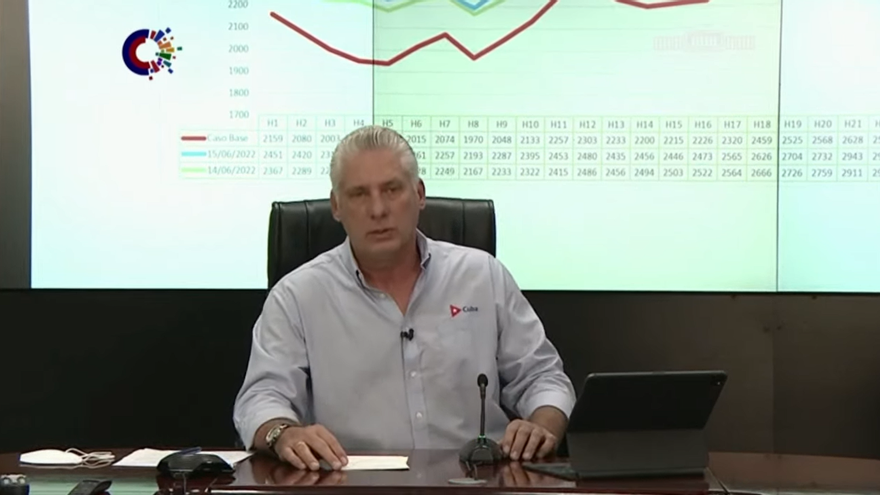
![]() 14ymedio, Havana, 16 June 2022 — Cuba’s National Energy System remains in critical condition after protests erupted across the country in recent days, rattling the nerves of Cuban government officials. Radio and television programming was interrupted on Thursday for an address by President Miguel Diaz-Canel, who emphasized that the country’s electricity generation would stabilize in the coming months. This did little, however, to relieve the frustration Cubans are feeling over the nation’s constant blackouts.
14ymedio, Havana, 16 June 2022 — Cuba’s National Energy System remains in critical condition after protests erupted across the country in recent days, rattling the nerves of Cuban government officials. Radio and television programming was interrupted on Thursday for an address by President Miguel Diaz-Canel, who emphasized that the country’s electricity generation would stabilize in the coming months. This did little, however, to relieve the frustration Cubans are feeling over the nation’s constant blackouts.
The president claimed that planned investments in repairs and maintenance, to be financed with income recently generated from tourism and sales at the nation’s hard currency stores, would stabilize electrical energy supplies within a few months.
Diaz-Canel admitted once again that the government did not have the generating capacity to meet the daily needs of the Cuban people, though his speech did offer a ray of hope: “Our country has signed an agreement with a friendly country, a negotiation by which three new generation ’blocks’ will be established, which will also have an eye towards the country’s future growth.”
The president explained that blackouts are the result of attempts to switch consumers from using electricity during peak hours to times when there is less demand and generating capacity is greater. He admitted, however, that this effort has not been successful due to current “conditions” at the nation’s power plants.
“Balancing this consumption load has been done society-wide, especially by limiting certain economic activities, but it is not possible to mitigate these peaks any further,” he said.
He also reported that recent repairs made to power plants have had little effect, citing one at the Lidio Ramon plant in Felton as an example. “These repairs are extremely costly for the country,” he added.
He described the construction of new facilities as “an investment that will take years,” adding that “you cannot create a new power plant overnight.” Without identifying the country or the exact date, he mentioned the establishment of new generation ’blocks’ to generate energy: “Our country, along with a friendly country, has signed an agreement, a negotiation by which three new ’blocks’ will be established, which will also have an eye towards the country’s future growth.”
In a television appearance late last month, Diaz Canel acknowledged the gravity of the situation and warned, “The coming days will be difficult.” He added, however, that things should improve by late May though he did not provide the audience with specific dates.
In a later appearance on the television interview “Roundtable” program, he acknowledged that the island’s power plants are operating at 40% capacity, with zero reserves. Since then, planned outages have been testing the well-worn patience of Cuban consumers, who have had to put up with outages lasting twelve to fourteen hours or more.
The blackouts have been met with protests at several locations throughout the island, as happened Monday night, when residents at the main campus of Ignacio Agramonte University in Camaguey lashed out after more than ten hours without power.
The protestors took to the streets, heading towards the city center to demand, and even prompt, the restoration of service. The power cuts have also been affecting the water supply, preventing residents from bathing.
A street protest erupted on Wednesday night on the streets of Manzanillo, a town in Granma province, prompting the power to be turned back on. In others cities, walls have been painted with slogans such as “Diaz-Canel Is an Asshole” and “Down with the Castros.” Others include “They’re Killing People” and “Homeland and Life.”
____________
COLLABORATE WITH OUR WORK: The 14ymedio team is committed to practicing serious journalism that reflects Cuba’s reality in all its depth. Thank you for joining us on this long journey. We invite you to continue supporting us by becoming a member of 14ymedio now. Together we can continue transforming journalism in Cuba.
